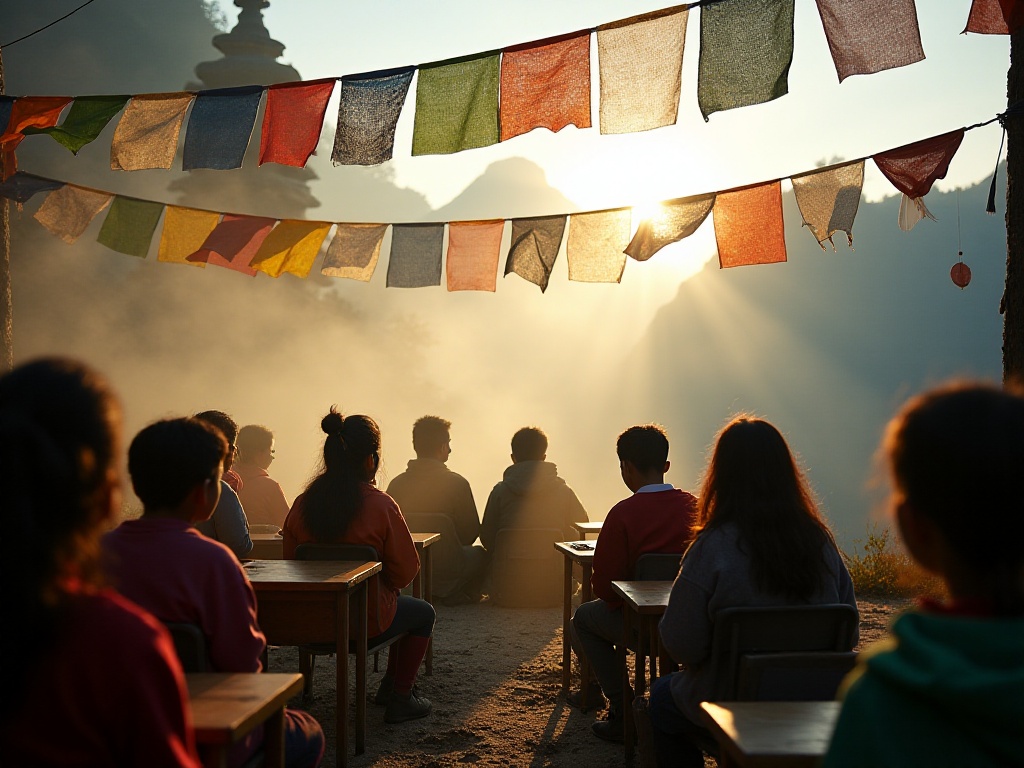Every time I open my social media feed, I see people checking in at trendy spots or posting from Bali. To be honest, I've grown weary of seeing the same things. Everyone visits the same places, takes the same photos, even strikes similar poses. After each trip, it seems nothing remains except a collection of photos and location check-ins on our phones.
I used to be the same way, carrying my camera everywhere, trying to cram every tourist spot into a single day. But looking back, can those rushed journeys really be called travel? It wasn't until last winter, during my 37 days in Nepal, that my understanding of travel was completely transformed.
It was a weekend, and I was lying in bed scrolling through short videos. Countless food and scenery clips passed by, none holding my attention for more than 3 seconds. Suddenly, a volunteer recruitment ad caught my eye: "Want a different kind of travel experience? Come volunteer in Nepal!"
To be honest, I didn't take it seriously at first, but the idea took root in my mind like a stubborn seed. I started researching, reading countless volunteer experience stories. The more I learned, the more I realized this was the kind of travel I wanted. After a week of careful consideration, I mustered the courage to apply for an IVHQ (International Volunteer HQ) program.

After successfully applying, I realized this trip wouldn't be as simple as I imagined. Just the preparation work was overwhelming. First came the visa materials, which required far more documents than a regular tourist visa. Then there were vaccinations - just researching which ones were mandatory versus recommended took me several days.
Packing was an even bigger project. Unlike a typical few-day trip, I would be living there for over a month, requiring much more consideration. I specifically bought teaching materials like colored chalk, basic English textbooks, and portable teaching aids. Considering local cultural customs, I also packed conservative clothing.
Most touching was meeting other volunteers heading to Nepal during the preparation process. We created a WeChat group, sharing our preparation progress and answering each other's questions. Though we'd never met, we developed deep friendships.
To better integrate into local life, I taught myself some Nepali. Beyond basic phrases like "Namaste" (hello) and "Dhanyabad" (thank you), I learned daily expressions like "Tapailai kasto chha?" (how are you) and "Khana khanu bhayo?" (have you eaten). Though my pronunciation might not have been perfect, I believed locals would appreciate the effort.

The day I finally arrived in Kathmandu, the weather was surprisingly good. My project coordinator Rajan, a Nepali man in his early 30s, spoke fluent English. His first words left a deep impression: "Here, you're not a tourist, but a temporary resident." This statement completely changed my mindset, giving me a fresh perspective on the life ahead.
I was assigned to a small school in suburban Kathmandu, mainly teaching English and basic computer skills. The school was just a two-story building with very basic facilities. The classrooms didn't even have basic multimedia equipment, just an old blackboard. But the children's eager eyes made it feel warmer than any luxurious classroom.
Every morning I woke up at 7, had a simple wash, then breakfast. Breakfast was typically traditional Nepali "Dal Bhat" - curry with rice. Though unfamiliar at first, I grew to love this simple delicacy. I arrived at school at 8, did morning exercises with the children, then started the day's lessons.
My students were between 8-12 years old, with varying English levels. Some couldn't write the 26 letters, while others could hold simple conversations. To accommodate everyone, I divided the class into small groups and designed different teaching content based on their levels.
The first few days were particularly tough due to the language barrier, making it hard to express many ideas. But gradually, I discovered body language and expressions were the best communication tools. Plus, the children were especially clever, always guessing what I wanted to express. Sometimes when I got stuck, they would help me with simple English.
After school ended at 4 PM, I would discuss teaching experiences with other volunteers in the teachers' office. We came from all over the world - American college students, retired Australian teachers, British social workers. Despite our different cultural backgrounds, we were united by the same goal. In the evenings, we would plan the next day's lessons together, learning from each other's teaching methods.
Most touching was the children's attitude toward learning. Despite harsh material conditions, their thirst for knowledge deeply moved me. I remember a boy named Amit who was always first to arrive at class. He lived in the mountains, walking over an hour to school. But even on rainy days, he was never late.
Every progress in class would excite the children immensely. When they could finally say "My name is..." in English, their joy filled the entire classroom. And when I taught them to type on computers, their reaction was as if they'd received the best gift ever.

On weekends, we participated in various local activities. Most memorable was making "momo" (Nepali dumplings) with local families. Unlike our dumplings, "momo" filling is mainly yak meat with local spices, creating a unique taste. While making them, the hosts would teach us Nepali while we taught them Chinese, time flying by amid laughter.
Community festivals were also highlights. During the Durga Goddess Festival, the entire community was immersed in joy. Every household lit oil lamps, and streets were filled with singing and dancing crowds. Locals invited us to join traditional dances, and though we danced clumsily, the heartfelt joy was indescribable.
Most unforgettable was visiting Sita's home. Sita was one of my most vivacious students, always smiling. Her home was about two kilometers up the mountainside, a traditional dwelling built of stone and wood. Though small, it was very clean. Her mother specially prepared Nepali milk tea for me, and I instantly fell in love with its rich milk flavor and unique spices.
At Sita's home, I got my first close look at daily Nepali life. Their pace of life was slow but fulfilling. In the evening, the whole family would gather, chatting over tea. No phones, no TV, just pure human interaction.
These 37 days in Nepal gave me many unexpected rewards. First was improved teaching ability. Facing language barriers and basic equipment, I learned to express complex concepts simply. This skill has greatly helped in my later work and life.
Second was a change in mindset. I used to think life had to be exciting and perfect everywhere. But here, I saw the most basic lifestyle. Though locals had limited material conditions, their smiles were more sincere than anyone's. This taught me that simplicity is also a form of happiness.
Most importantly, my understanding of life changed. Previous travel was more about achieving a "been there" feeling. But this experience taught me that real travel should be about heartfelt experience of a place, understanding its people, experiencing their way of life.
I remember the last day, when students prepared a surprise. Each drew a picture and wrote "Thank you teacher" in wobbly Chinese. Amit even wrote me a letter in Chinese, though just a few simple sentences, every word filled with sincerity. At that moment, I couldn't hold back my tears.

This volunteer travel experience completely changed my understanding of "travel." Real travel isn't about visiting a place for a few days, taking some photos and leaving. It's about truly integrating into local life, understanding local culture, building genuine emotional connections.
Through volunteering, we can integrate into a strange environment with a new identity. No longer passing tourists, but contributors to the local community. This sense of participation and achievement is something ordinary travel can never provide.
Looking back now, those moments teaching in class, making dumplings with locals, playing with children, have become my most precious memories. These experiences taught me that travel's meaning isn't about how many places you've been, but how much genuine feeling you've left in each place.

If you're also tired of traditional travel, try volunteer travel. It will give you a completely different perspective, showing you the world's most authentic side. Like my 37 days in Nepal - though not long, they gave me unforgettable experiences and changes that will last a lifetime.
This world is vast, with so much beauty waiting to be discovered. Rather than rushing through, why not pause and feel each moment heartfully. Perhaps this is the true essence of travel.
For your next trip, what kind of experience will you choose? Perhaps a volunteer journey will show you a completely different world.
 Previous
Previous
